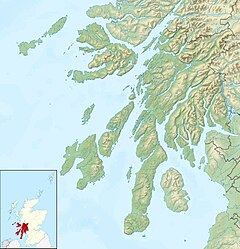Innellan
This article needs additional citations for verification. (October 2011) |
| Innellan | |
|---|---|
 The Osbourne Hotel, Innellan | |
Location within Argyll and Bute | |
| Population | 1,140 (mid-2020 est.)[1] |
| OS grid reference | NS 14500 70200 |
| Council area | |
| Lieutenancy area |
|
| Country | Scotland |
| Sovereign state | United Kingdom |
| Post town | DUNOON, ARGYLL |
| Postcode district | PA23 |
| Dialling code | 01369 |
| UK Parliament |
|
| Scottish Parliament |
|
Innellan is a village in Argyll and Bute, Scotland, on the western shore of the Firth of Clyde. It is four miles south of Dunoon.
History[edit]
The origin of the name "Innellan" is obscure. The village was developed as a holiday destination in Victorian times on the site of a smaller and older farming settlement, and the first steamboat pier was built in 1851.[2][3] With a resident population of around 1,000, growing to many more in summer, Innellan found prosperity as one of many seaside resorts along the shores of the Firth of Clyde serving tourist traffic primarily coming from the city of Glasgow further upriver, travelling on Clyde steamers.
Notable people[edit]
- George Paton, recipient of the Victoria Cross
- John Thomas Rochead lived here briefly in 1871
Decline[edit]
This prosperity started to fade in the 1960s with the increasing availability of foreign holidays to the general public. Competing against resorts in Europe that enjoyed Mediterranean climates, the popularity of all the Clyde seaside resorts fell.
It was around this time that an American naval base in the nearby Holy Loch was established, providing some aid to the local economy, although being controversial. The base was withdrawn in the 1990s.
The village's most striking landmark from its heyday as a seaside resort - the large Royal Hotel that overlooked the pier - was destroyed by fire in 1981 and the site has yet to be redeveloped. The entrance gates to its former site on Pier Road still show the sign for the hotel. Innellan's pier, which passenger steamers regularly called at whilst the area was booming, was extended in 1901 but finally closed in 1972 in response to reduced usage. After falling into increasing disrepair, it was fully dismantled in the mid-1990s.[citation needed]
Primary school[edit]
Innellan Primary School was established in 1868.[4]
Churches[edit]

Innellan once had four churches; two Church of Scotland, one Free Church and one Episcopal. Two of them still stand; the former West Church is now converted to a house, and the remaining Innellan or Matheson church was the charge of the Reverend Dr George Matheson, the blind minister who wrote the hymn "Oh Love that wilt not let me go."[4] Although it is commonly believed that he wrote this hymn after he had been jilted by his fiancée, the truth is that he composed the hymn after experiencing a personal crisis. There is a small spiral staircase leading from a room on the basement level of the church to the alter - and it was rumoured that this staircase was created for Matheson so that he had a direct route to the alter; however this may be nothing more than myth!
Innellan Church was sold in 2023 and is now privately owned. Until recently, locals were still attending it for church services and/or weddings, funerals and even craft fairs - such as quilting exhibitions. The attached hall at the back/side of the hall held various clubs/activities over the years including Sunday Schools, fitness classes and a church-related family group called Alpha that held events and showed films. A children's choir run by Dunoon Grammar School music teacher Ian Davies, his wife Primary Teacher Mary and Mary's mother (and local piano teacher) Peggy Thompson rehearsed in the hall occasionally during the late 1980s/early 1990s. Innellan youth club was set up by local young people in the 1990s and ran for several years in the hall. The Innellan Youth Club was not affiliated with any religion and was simply a sociable club using the church hall - likewise the young people's choir.
A history of Innellan was written by the Rev John Hill, minister of the West Church, in 1950.[4] It is now out of print, and was somewhat preoccupied with religious affairs. More recently, local resident Margaret Hubbard wrote a comprehensive collection of books about significant moments across the village's history. The books are known as "From Scenes Like These, Innellan" and the first of the collection was published in 2010. [5]
Innellan today[edit]

Innellan possesses views across the Firth of Clyde, stretching from Kilcreggan and Loch Long (looking north) to Cumbrae Head and Ailsa Craig (looking south). There is a local golf club, with a nine-hole course on the hill.[citation needed]
The village's strip of shops (which once numbered fourteen) has now been reduced to just the Post Office. There are two pubs in the Village, The Osborne and The Villagers Royal, but other services are provided by the nearby town of Dunoon, which is linked by a bus service.[citation needed]
References[edit]
- ^ "Mid-2020 Population Estimates for Settlements and Localities in Scotland". National Records of Scotland. 31 March 2022. Retrieved 31 March 2022.
- ^ Williamson (1902). Clyde Passenger Steamers 1812-1901.
- ^ "News Archive: £320,000 on travellers' toilets". Dunoon Observer. 30 June 2006. Retrieved 14 December 2016.
- ^ a b c Hill, Rev. John (1950). Innellan. Church of Scotland Hymnary.
- ^ "Margaret Hubbard - published author". Scotland's Story with Margaret.
External links[edit]
- Map sources for Innellan

